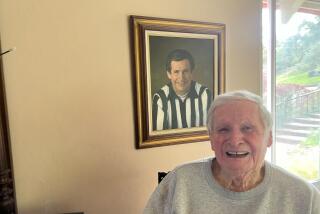Abusive Crowd Was No Concern for Boxing Referee Wyatt Earp
- Share via
Boxing referees often take a heap of vocal abuse. Sometimes the abuse becomes physical.
Richard Steele ended up on the ring floor being kicked in the leg and chest after he decided Donovan “Razor” Ruddock had had enough in the seventh round against Mike Tyson.
The referee is helpless in such circumstances. Well, there was one referee. . . .
It was Dec. 2, 1896, and many in the crowd at Mechanics’ Hall in San Francisco would have liked to get their hands on the referee, but thought better of it because the official had a gun in his hand.
The six-shooter also dissuaded an irate Bob Fitzsimmons, who was the loser on a foul to Sailor Tom Sharkey.
“There was almost a riot as the fight ended, and Fitz made a rush at Earp,” Alexander Johnson wrote in “Ten and Out: The Complete Story of the Prize Ring in America,” which was first published in 1927.
“That gentleman is reported to have drawn a gun.”
The referee was Wyatt Earp, a gambler, entrepreneur and part-time lawman, who has become a part of the myth of the Wild West.
It would appear that Earp had reason to be armed.
Johnson called it “one of the classic crimes of the American ring.”
“In the event in question, Fitzsimmons stipulated the winner should take the whole of the purse ($10,000),” W.W. Naughton wrote in his 1902 book, “Kings of the Queensberry Realm.”
“Beyond the doubt, the selfishness of this demand put tricksters in Sharkey’s camp on their mettle and was responsible for the hatching out of the scheme to defraud the Cornishman in case he proved the Sailor’s master.”
Naughton, who was at the fight, wrote that Martin Julius, Fitzsimmons’ manager and brother-in-law, protested Earp’s appointment because “he had heard rumors of collusion, which impelled him to ask that another referee be selected.”
Paula Mitchell Marks, however, described Earp selection as referee as a compromise because of rumors the fight might be fixed in her 1989 book “And Die In The West.” This is a painstakingly researched reconstruction of the stay of Earp and his brothers in Tombstone, Ariz., in the 1880s and the role of Wyatt, Virgil and Moran Earp and Doc Holliday in what became known as the “Gunfight at the OK Coral.”
The appointment of Earp, who was then living in San Francisco, as referee touched off a furor even before the fight began.
The crowd “reacted angrily when it realized that he (Earp), an ‘utterly inexperienced referee,’ was going to officiate. Wyatt promised a fair fight, then took of his frock coat, exposing his .45 and leading the fans to respond negatively again, with one fan shouting that Earp was a ‘two-gun man,”’ Marks wrote.
The crowd settled down, however, she explained, when “a San Francisco police captain attending announced, ‘Wyatt Earp’s word is good with me.”’
In her account of the fight, Marks wrote that Fitzsimmons landed a low blow in the third round, but that Sharkey told Earp he was okay. Then in the eighth round, “Fitzsimmons landed another low blow, apparently unintentionally and hidden from the view of most of the audience. Sharkey fell, out cold and Wyatt declared him the winner because of the low-blow foul.”
Naughton complained reporters were partly obscured from seeing the fighters, but “what appeared to be a legitimate body blow caught the Sailor somewhere around the stomach. A second later, a left hook took him on the chin and he dropped. He made a feeble attempt to rise, but the 10 seconds passed away. So sure were the newspaper men of Fitz’s triumph that some of them sent dispatches across the wires announcing the Cornishman’s victory.”
When it became apparent that Sharkey was the winner, “the majority pronounced the decision a cold-blood robbery,” Naughton wrote, “but others, and among them the chief of police of San Francisco, insisted Fitzsimmons had struck Sharkey a low blow and that they had witnessed it.”
Fitzsimmons, who would become heavyweight champion, tried unsuccessfully in court to get the $10,000 purse.
The fight also was costly to Earp, who never refereed again.
According to Marks, the Terror of Tombstone was fined $50 for carrying a concealed weapon.
More to Read
Go beyond the scoreboard
Get the latest on L.A.'s teams in the daily Sports Report newsletter.
You may occasionally receive promotional content from the Los Angeles Times.










